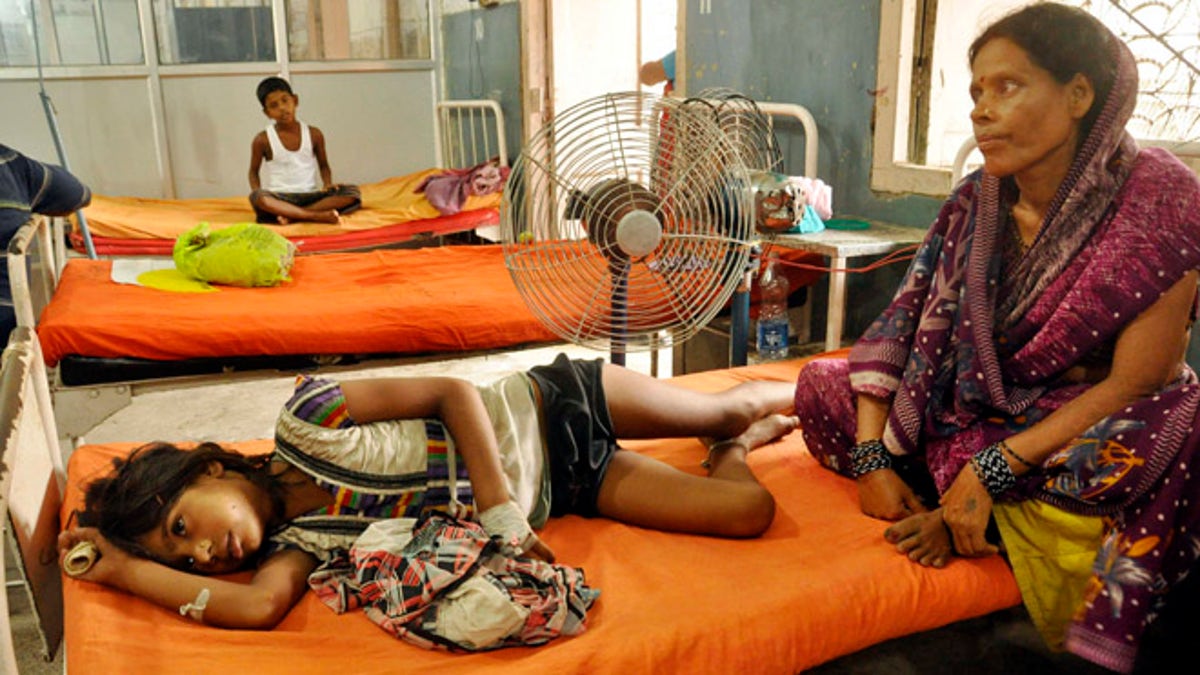
July 18, 2013: An Indian woman sits beside a child who fell sick after eating a free school lunch, at a hospital in Patna, India. Indian officials say at least 22 children have died and more than two dozen others were sickened after eating a free school lunch that was tainted with insecticide. (AP)
PATNA, India – Soon after they served the daily free lunch they had prepared for dozens of children at a rural Indian school, the two cooks realized something was very wrong. The students started fainting. Within hours, they began dying.
By Thursday afternoon, 23 children between the ages of 5 and 12 had died from eating food laced with insecticide and many others had fallen ill.
Authorities discovered a container of pesticide in the school's cooking area next to the vegetable cooking oil and mustard oil, according to Amarjeet Sinha, a top official in the state of Bihar, where the tragedy took place.
"It's not a case of food poisoning. It's a case of poison in food in a large quantity, going by the instant deaths," he said.
Earlier, some officials had said it appeared that the rice had somehow been tainted with pesticide and might not have been properly washed before it was cooked.
More answers were expected Friday, when a forensic laboratory was to issue the results of its tests on the dead children, the food and the uncooked grain stored by the principal in her house, he said. Police were searching for the principal, who fled after the students started falling sick, Sinha said.
The cooks, Manju Devi and Pano Devi, told The Associated Press that the principal controlled the food for the free daily lunch provided by the government at the school. On Tuesday morning, she gave them rice, potatoes, soy and other ingredients needed to prepare the meal and then went about her business. As the children ate, they started fainting, the cooks said.
The two cooks were not spared either.
Manju Devi, 30, ate some of the food and fainted. Her three children, ages 5, 8 and 13, fell ill as well. All were in stable condition Thursday.
While Pano Devi, 35, didn't eat the tainted food, her three children did. Two of them died and the third, a 4-year-old daughter, was in the hospital.
"I will stop cooking at the school," she said. "I am so horrified that I wouldn't grieve more if my only surviving child died."
Sinha said one of the cooks told authorities that the cooking oil appeared different than usual, but the principal told her to use it anyway. Doctors believed the food contained an organophosphate used as an insecticide, he said.
The free midday meal was served to the children Tuesday in Gandamal village in Masrakh block, 50 miles north of Patna, the Bihar state capital.
Those who survived the poison were unlikely to suffer from any serious aftereffects from the tainted food, said Patna Medical College hospital superintendent Amarkant Jha Amar.
"There will be no remnant effects on them. The effects of poisoning will be washed after a certain period of time from the tissues," Amar said.
Amar said Thursday that the post-mortem reports on the children who died confirmed that insecticide was either in the food or cooking oil. He said authorities were waiting for lab results for more details on the chemicals.
India's midday meal scheme is one of the world's biggest school nutrition programs. State governments have the freedom to decide on menus and timings of the meals, depending on local conditions and availability of food rations. It was first introduced in the 1960s in southern India, where it was seen as an incentive for poor parents to send their children to school.
Since then, the program has been replicated across the country, covering some 120 million schoolchildren. It's part of an effort to address concerns about malnutrition, which the government says nearly half of all Indian children suffer from.
Although there have been complaints about the quality of the food served and the lack of hygiene, the incident in Bihar appeared to be unprecedented for the massive food program.
